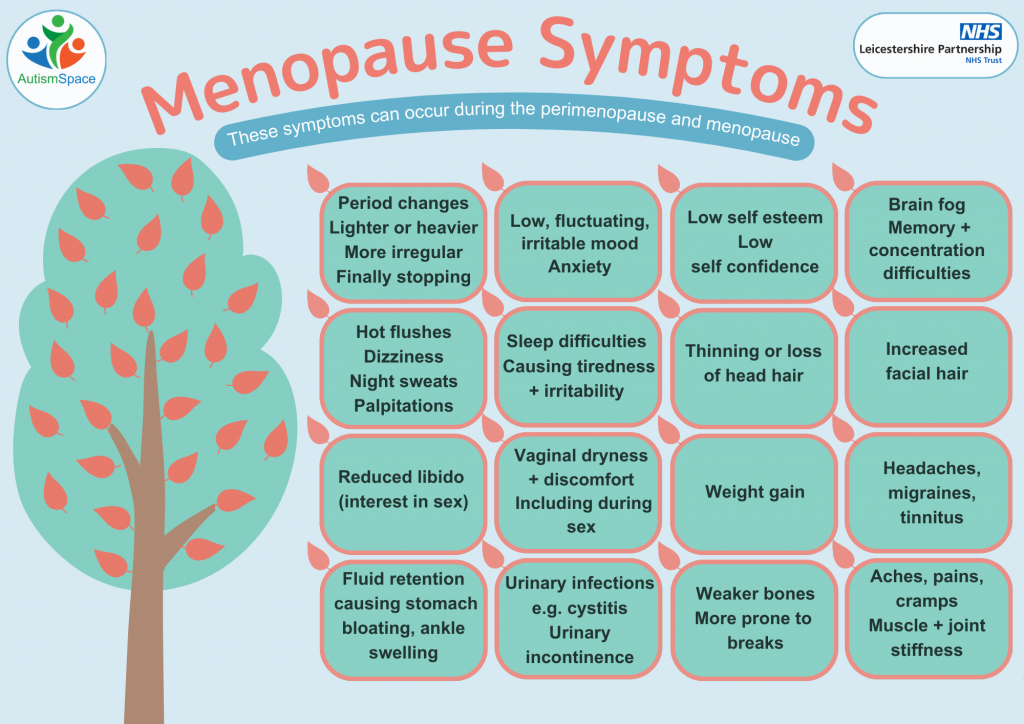We recognise that some people born with female physiology do not identify as being a woman and that some people who identify as being a woman do not have female physiology. To respect this, in this article we avoid talking about the menopause as something only women experience.
As we progress through life and our bodies age, changes occur. One of the most significant and impactful biological changes is the menopause.
Periods are part of the reproductive system – helping to enable pregnancy and the creation of new human life. Humans with female physiology are designed to produce and rear children during our younger years. As we get older, this ability slows down and eventually stops. The most notable sign of this is the slowing down and stopping of periods.
We call this change ‘the menopause’ – and it is caused by a decrease in hormone levels in the body.
Once a person has not had a period for more than 12 continuous months, they are said to be experiencing the menopause.
The menopause normally happens between the ages of 45 and 55, though can sometimes happen earlier. Some people might start the menopause earlier due to other health conditions or treatments (such as medication or surgery).
In addition to periods stopping, the changes in hormone levels also bring about a wide range of other symptoms, which affect both the body and the mind. Many of these can cause problems with daily functioning.
What is the perimenopause?
The time leading up to the menopause is known as the ‘perimenopause’. During the perimenopause, periods may become less frequent, heavier, and / or less regular. Any of the other menopausal symptoms may also occur.
What other symptoms occur during menopause and perimenopause?
The hormonal changes that cause periods to stop can also cause any of the following:
Emotional changes – including low mood, fluctuating mood, anxiety and low self-esteem.
Problems with memory and concentration – often described as ‘brain fog’.
Hot flushes – where the person can suddenly feel very hot. These are often accompanied by dizziness, night sweats and palpitations.
Physical symptoms – such as prolonged headaches and migraines; aches, pains, cramps and stiffness in the muscles and joints; bones become more fragile and more prone to breaking; swollen ankles; vaginal dryness, itching and pain during sexual intercourse; frequent urinary tract infections; weight gain; hair thinning/loss
Whilst not everyone will experience all of these symptoms during the perimenopause and / or menopause, these are some of the symptoms which can occur:
Click here to view or download this graphic as an accessible pdf
Impact of autism on the menopause and perimenopause
Even those who have not experienced the menopause could read the list of symptoms above and imagine the sorts of difficulties and stress this might cause.
Whilst research is limited, and reported information from autistic people is varied, it seems that overall autistic people may be even more sensitive to these hormone changes than most neurotypical people. There is indication that menopausal autistic people are particularly prone to experiencing significant negative impact on their mental health and emotional wellbeing.
Research (click here to view a webinar recording) also indicates that the difficulties autistic people are already facing become even more challenging during the menopause. For example, they may find themselves having more communication breakdowns and feeling extra sensitive to social pressures and unpredictability. They may particularly notice more heightened sensory sensitivity – like finding noise and lighting levels even more intolerable.
It’s especially important to recognise that autistic people commonly find change very difficult to tolerate. It is believed that they have higher rates of lifetime stress and traumatic experiences, which then alter brain wiring – and make a person more susceptible to future stressful events. This of course, includes the menopause.
The combination of autism specific menopause difficulties with general menopause symptoms can cause significant negative impact on relationships, family life, friendships, work – and even on basic self-care.
This is why it is so important for autistic people to do what they can to prepare themselves for this extra-challenging life experience.
How can you help yourself?
Prioritise the following
- Find out about the perimenopause and menopause – ideally before you start to experience them
This will give you an idea of what might happen – and therefore reduce unpredictability
- Try to be aware of any changes you notice with your body and mind. Consider keeping a record so you can remember and monitor – and if necessary, share with a health professional
- Ensure you make the time and effort to practise self-care
If you are autistic and think you may be experiencing the perimenopause or menopause, here are some things you can do to look after yourself:
- Get plenty of rest and try to keep a regular sleep routine
- Eat a healthy diet. Make sure this includes calcium rich foods such as milk and cheese as this will promote bone health and reduce the risk of osteoporosis (link to nhs article)
- Do regular exercise. Include weight-bearing exercise (walking, running or dancing) and try relaxing activities like yoga, tai chi or meditation.
- Talk to your support network or join online communities
- Stop smoking and cut down on alcohol
Many people lack awareness about the menopause – such as what to expect and what can help. This often results in them finding it difficult to get the right support at the right time.
This can be even more problematic for autistic people, who often experience barriers to accessing healthcare. They may also struggle to communicate with their family, friends and GP about any menopause related issues, meaning they might fail to ask for or receive advice or support when needed – and their support network may fail to realise that they are struggling.
Again, for these reasons too, it is really important that autistic people know what to expect even before they go through perimenopause and menopause. It is not only advisable that they prepare themselves but also advisable that they make sure their family and / or partner, GP, and workplace are all aware of what to expect. As well as needing to be aware of general menopause symptoms, they also need to be aware that the autistic experience of menopause and the difficulties they may experience can be different than for most other people.
What treatments are available?
The treatment for perimenopause and menopause symptoms is the same for autistic and non-autistic people.
Hormone replacement therapy (HRT) is the main medical treatment.
HRT medication contains hormones which replace the oestrogen and progesterone that the body produces less of during menopause.
GPs cannot prescribe HRT to everyone- as some people have medical conditions which make it unsafe. Some people would be eligible but choose not to take it.
If you think you might like to try HRT, you would need to take advice from your GP about whether you are medically eligible and if so, what your individual potential advantages and disadvantages might be.
If the menopause symptoms you are struggling with include hot flushes, night sweats or mood changes, there are alternative non-hormone medications available.
Talking therapy can also help with mood and anxiety changes brought on by menopause and perimenopause.
Where to go for help
If you are experiencing perimenopause or menopause symptoms that you are struggling to manage, seek advice from your GP.
To get the best out of the consultation, before you go, make some plans about what you want to ask and tell them.
Here are some ideas of things you might want to consider
- Do some reading up on the menopause beforehand so that you have an idea of what help you might want and whether that is emotional and physical or both
- When you call to make the appointment, tell the receptionist that you wish to discuss menopause symptoms with a GP.
Explain that you want to book your appointment with the GP who is the most sympathetic and knowledgeable with this topic
- Before you go to the appointment, make some lists of the following, to take with you and to tell the GP:
- Any physical changes
- Any emotional changes
- How these affect your everyday life
- How these affect your feelings
- At the beginning of the appointment, state very clearly what you need.
Based on the symptoms you are experiencing and what you know about the menopause, tell the GP about your ideas, concerns, and expectations.
For example:
“I think I am going through the menopause. I want to tell you about the symptoms I am struggling with. I want you to tell me if there is any treatment or anything else I can do to improve things. I’ve heard about HRT; can you please tell me more about if this could help me?”
Is there anything positive about the menopause?
The menopause usually lasts for about 4-5 years – though varies from person to person. Whilst it’s certainly a challenging time for many, once it’s complete, there are some considerably positive benefits to look forward to, such as:
- Your memory will improve
- You’ll sleep better
- You’ll feel happier
- You’ll be less disappointed
- You’ll feel much calmer
- You’ll have fewer headaches
- Your sex life might improve
- You’ll feel more confident
- You’ll have fewer colds
- You’ll have more freedom
Click here to view the source and more details about this on the Saga website.
In Summary
The menopause happens to everyone who has periods usually at around age 45-55. It can cause a range of physical, cognitive and emotional symptoms, triggered by changes in decreasing hormone levels. Autistic people may experience an increase in difficulties associated with both their autism and the menopause combined. This means autistic people can experience the menopause differently from non-autistic people and can find the menopause particularly challenging. Autistic people can benefit from learning about the menopause so that they know what to expect and can make plans for how and when to ask for help from others. If you are an autistic person going through the menopause, it will help if you practice self-care and you may also want to seek support from your GP who might be able to offer you treatment for some symptoms.
Resources
Click here to view a helpful colleague resource pack
Rock my Menopause is the public-facing campaign of the Primary Care Women’s Health Forum (PCWHF), a group of 10,000 healthcare professionals with a special interest in women’s health: Click here to view the website of Rock my Menopause.
Click here to see information about an app for recording symptoms of menopause
Click here to view information for working people experiencing menopause
Click here to view the women’s health concern webpage
Click here to view the Menopause Charity – Menopause Facts, Advice and Support
Click here for menopause information for the LGBTQI+ community
For premature menopause information click here
To view information about a study into how ‘Menopause is Different for Women of Color’ click here
Click here to view an NHS guide for how to manage symptoms of your menopause
For physical activity ideas during the peri/menopause click here
_____________________________________________________________________________________________________________________________________________________________
For our directory of health related resources and services, please click here
_____________________________________________________________________________________________________________________________________________________________








